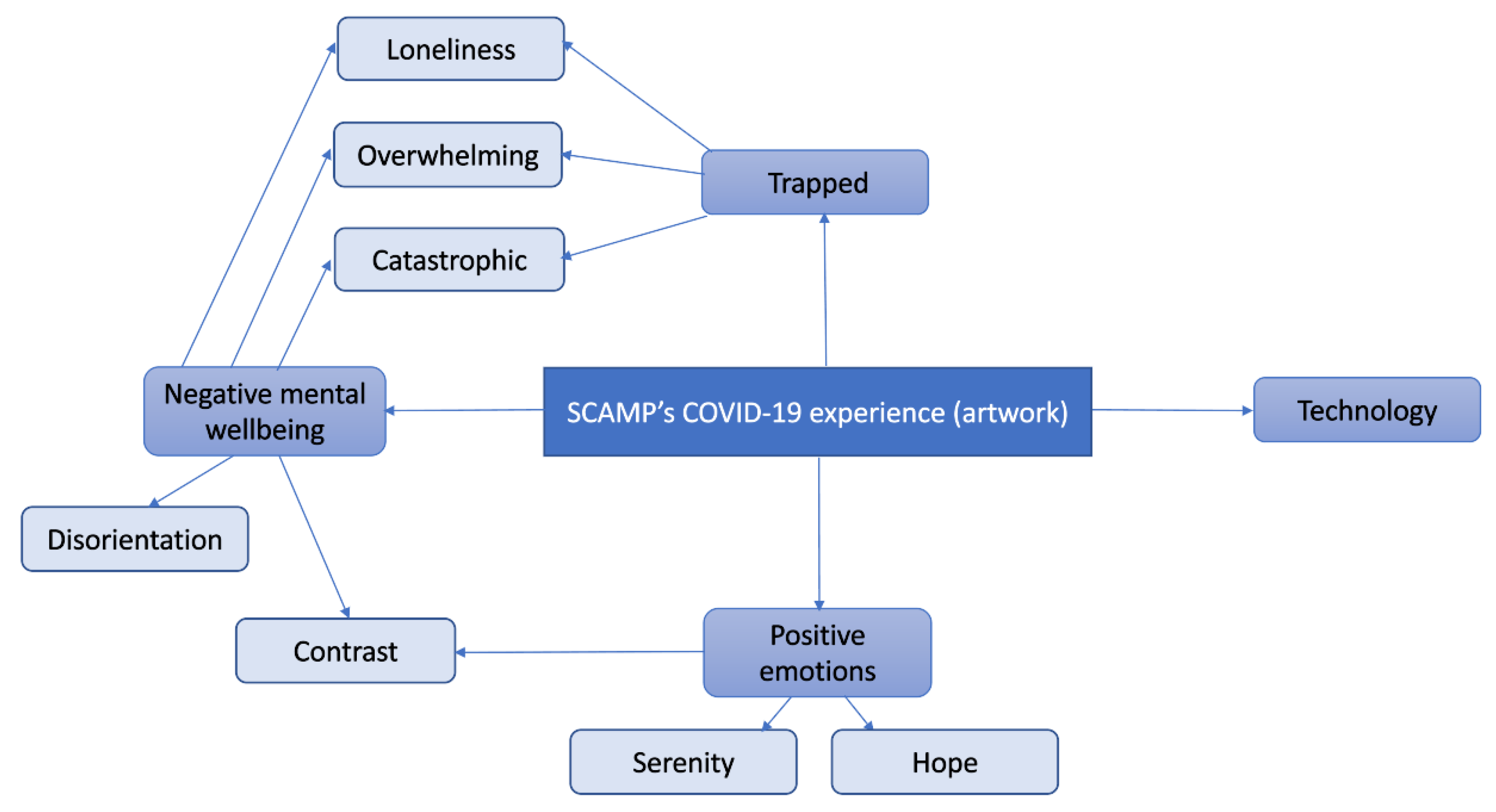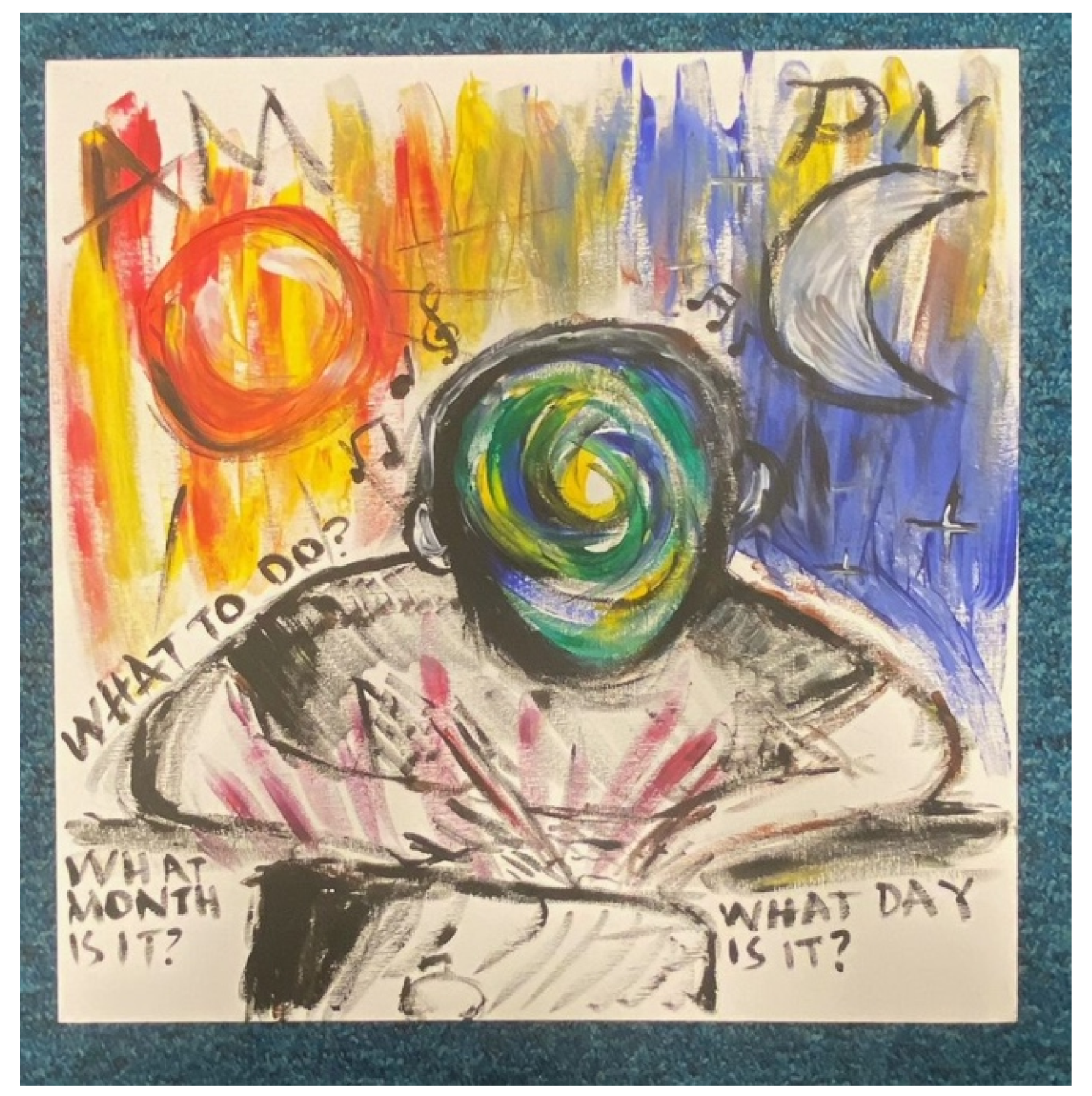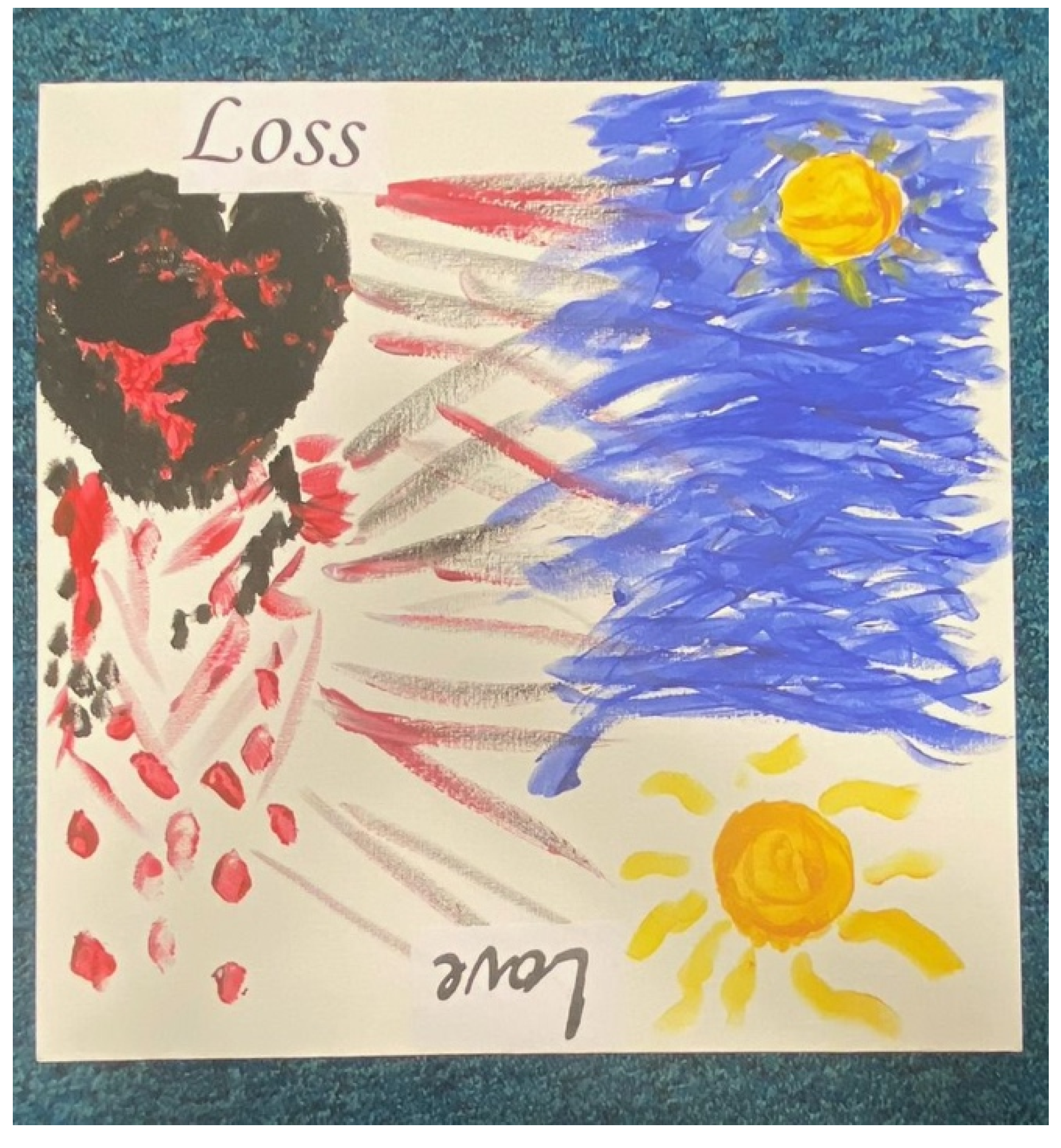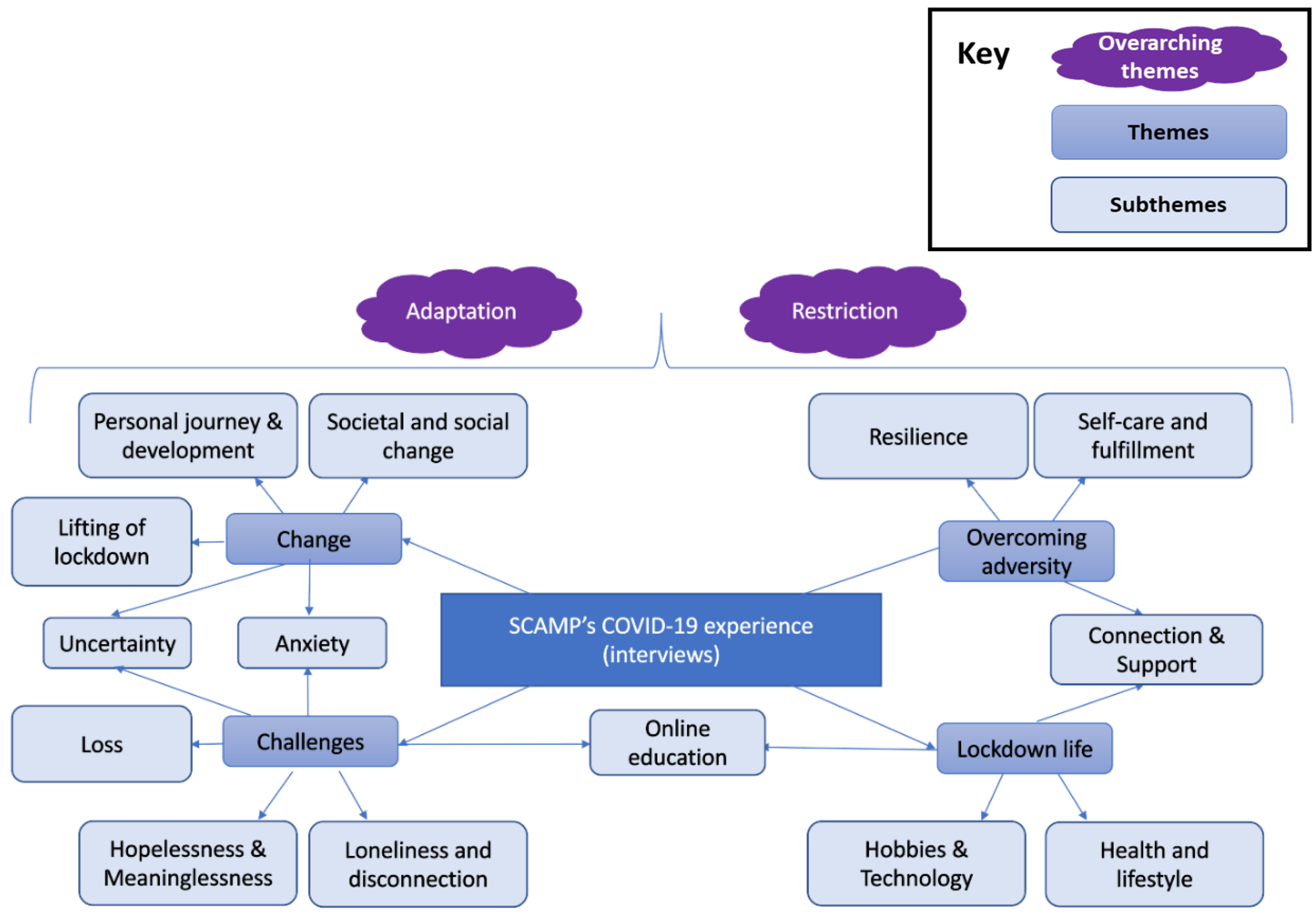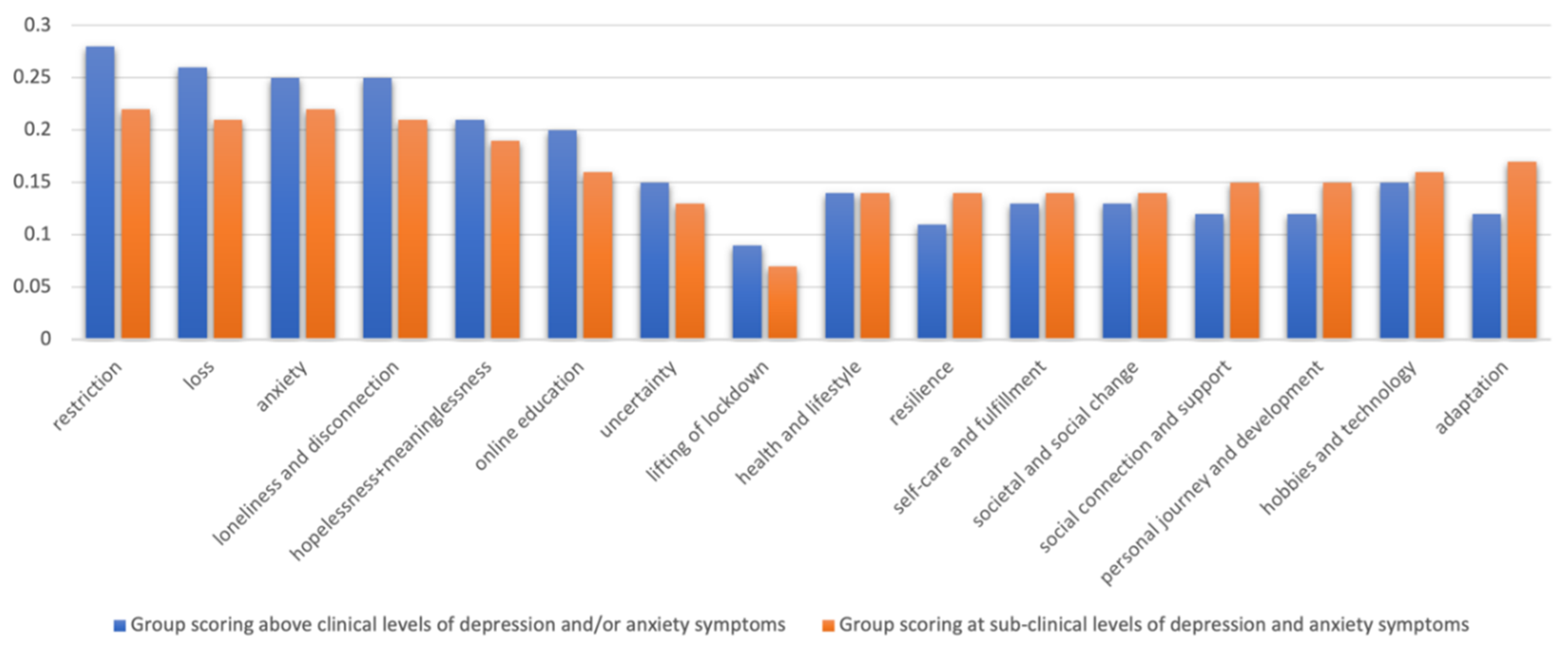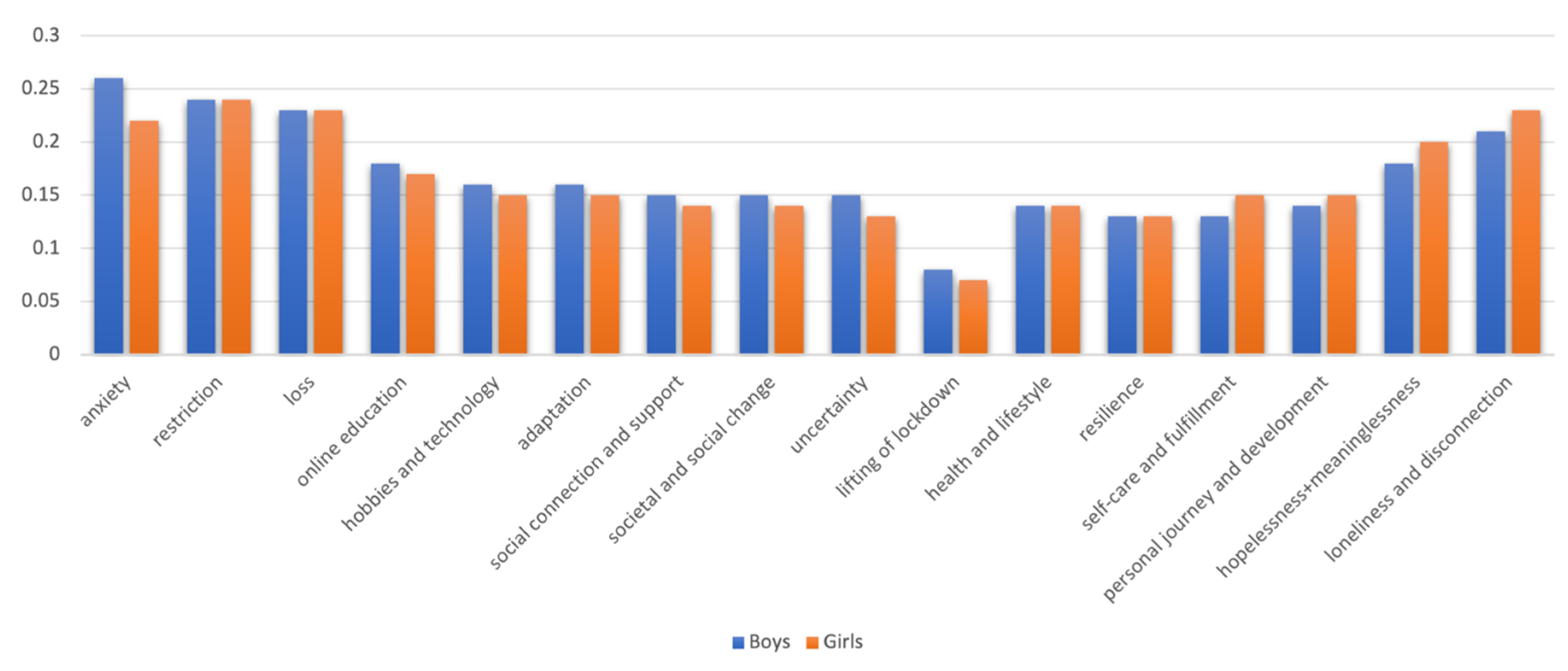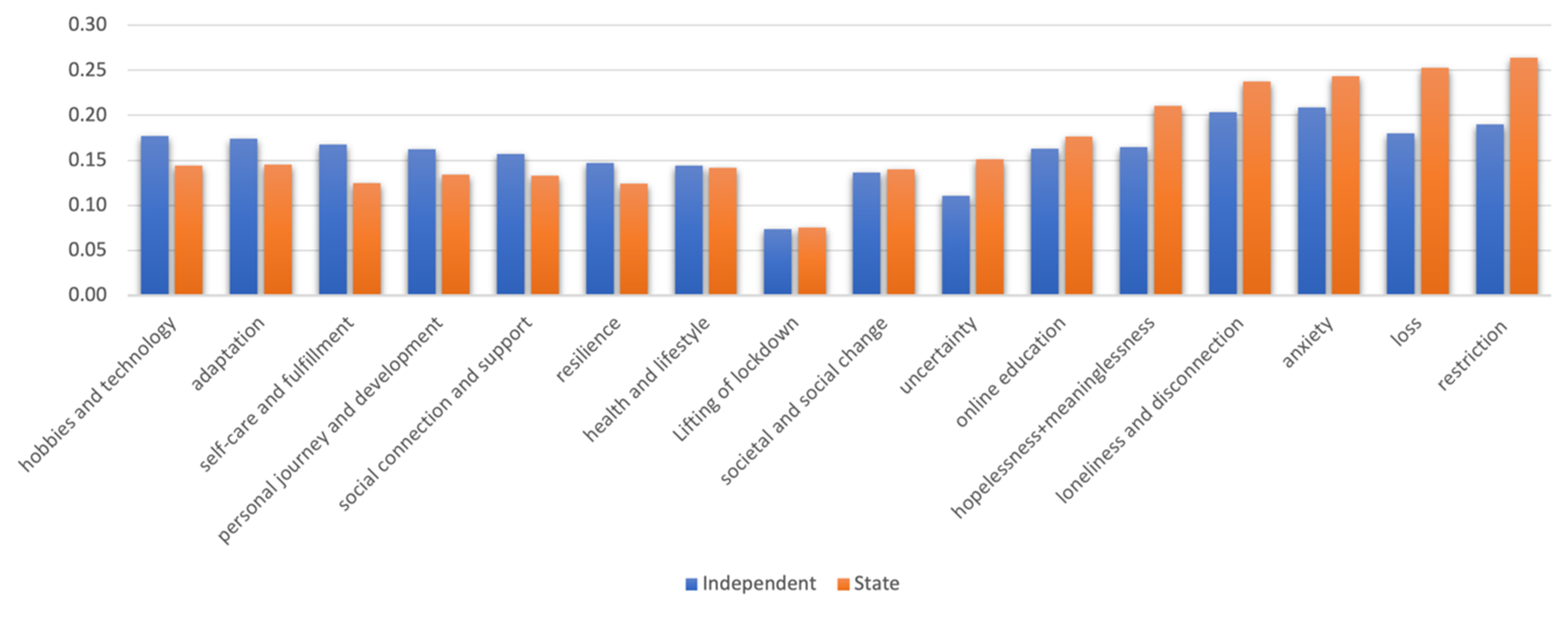3.1.2. Themes
1. Change
Societal and social change
This subtheme encompassed societal and social changes. As well as changes during lockdowns, such as to how people could interact and behave, this included changes that occurred following the lifting of restrictions. For example, loss of social skills, increased social awkwardness, increased attention to personal hygiene and potential transmission of disease, increased home and flexible working, and reduced physical contact between people.
"It was out of nowhere as well, it was just like on a Friday, you're not going to go into school anymore, everything is going to be different" P2, male, 18 years
"I also got this thing, vibe from other people that they don't know how to talk to me. So it, kind of, felt like we were all in the same situation of not knowing how to talk to people” P8, female, 17 years
"you're used to eating without sanitising, sometimes you’d just eat, just outside, wherever. Now you're like, 'How did I do that in the past?'…I'm disinfecting all the tables, I'm disinfecting my hands. It's things that I used to never do before that now I do. I'm like, 'How did I not do it in the past?'" P9, female, 16 years
This subtheme is about personal change from the pandemic. Some participants talked about being less close with friends, less able to connect with others, or changing their future expectations following disruptions to education and other opportunities. Yet, many also talked about a renewed appreciation of their loved ones, freedom, health, and themselves. Many participants found independence and self-reliance and learnt they could emerge strongly from difficult experiences.
"I would have to make friends all over again with people that I used to be friends with, because I stopped talking to them. It was like we were all completely different people now, because we experienced something really influential on our lives, so we all either took it very negatively or very positively and that, kind of, made us the way we are today post-lockdown.” P8, female, 17 years
"Anything I've gained, yes, quite a lot of lessons. I've seen a side of me that I've never seen before or experienced. I've gained a lot of courage and I would say humanity to be honest. That's the main thing." P15, male, 16 years
The lifting of lockdown measures had a variable impact: some participants found it easy to adjust back and adopt previous routines, finding it liberating, exciting, or hopeful, whilst others found it challenging to socialise and reintegrate into society, finding crowds and in-person meetings overwhelming.
"It was the biggest relief, to be honest. It felt a lot more like suddenly there is an end in sight, when you're giving a specific date of, like, 'Okay, so now this will happen,' it just suddenly feels like, 'Okay, the world's not ending.” P4, female, 16 years
"I think I was more scared about coming out of my shell, because I think, you know, the way I'd isolated myself, it was scary going back and talking to those people. Explaining why I wasn't online. I think that was scary... I think I was so comfortable to this type of lifestyle, that going out was just tiring for me.” P17, female, 17 years
“It sounds weird, but I was, like, really scared of going into the supermarket after the pandemic. It's just, like, seeing that many people in a small space." P13, female, 17 years
A subtheme shared by the themes of ‘change’ and ‘challenges’ was ‘uncertainty’. The level of uncertainty about what would happen, particularly around education, exams, and grades, left many young people feeling unsupported and anxious.
"When lockdown first happened it was a bit of a shock to me because I was, like, 'Wow, what happens next? I mean, what is going on?" P15, male, 16 years
“Over a period I would say your brain had started questioning, like. It was very strange, that questioning your brain was doing. It was, like, 'Oh, will this violence ever end?' Or, 'What if lockdown lasts for years on top of years? What's going to happen to my education?’" P14, male, 18 years
"It was just a really big grey area, so there was no certainty. And there was just constant stress.” P8, female, 17 years
Anxiety was another subtheme shared by the themes ‘change’ and ‘challenges’. Predominant sources of anxiety were change, uncertainty, fear of infection, and fear of infecting other people. However, the largest source of anxiety was school and education-related anxiety; fear of what would happen with exams and grades, falling behind, or not doing as well due to remote education. Most of the young people found the second lockdown easier than the first, which was attributed to the fact that schools were more prepared, so they felt more supported and had less educational stress. In the second lockdown there was also a sense of ‘having done this before’ which reduced uncertainty and anxiety.
“Especially the first lockdown. I was, like, what is going to happen next?' I mean, cases were rising, there was panic everywhere. I wasn't, you know, in a good place at the time and I was just confused about the future and for me especially there was just a big question mark on the future. I mean, what is going to happen next? What is this?” P15, male, 16 years
"The problem was we were all constantly worrying about our future, especially with loads of people's work experience got cancelled. But when lockdown was actually announced, I think, yes, there was no support from the school as well, which is terrible. I mean, we did have exams. We knew we were going to have exams by the end of it, but there was no support from school. So all of that pressure really just got to us." P17, female, 17 years
"I guess my biggest concern was just if it was ever going to end, you know? Before we got any dates, before we got any roadmaps, any tiers, any of that, it just felt like never ending and you'd open the news, and you look at the news, you look at the statistics and every day it just seemed more and more negative and depressing. And my biggest concern was just that, that it was never-ending and that I was going to spend my whole life in lockdown." P4, female, 16 years
2. Challenges
Uncertainty (shared with change, as above)
Anxiety (shared with change, as above)
Loss
As a subtheme, loss included bereavement but also loss of freedom, opportunities, and connections. Even for those without a direct bereavement, having friends who had been bereaved and the potential of bereavement at any time was a source of distress.
"He was just there and then he wasn't the next moment. So, it just proved to me that things do change overnight sometimes." P5, female, 18 years
“I was just thinking ‘Now, please, I just don't want them to get COVID.' because if anything happens, I can't really bear another loss.” P17, female, 17 years
“Even though it wasn't me directly, just knowing that people actually are losing people they love due to the pandemic, it makes me feel like I've lost something as well, even though it wasn't me, you know." P8, female, 17 years
Although many young people felt initially excited about lockdown due to the novelty of getting to stay at home and have a break, this was not maintained. For many, the monotony, lack of day-to-day routine and purpose, without a clear end point in sight, led to feelings of hopelessness and meaninglessness. Those who found the second lockdown more difficult than the first attributed this to lost novelty and feelings like frustration and boredom.
"I wasn't properly getting up for school. I wasn't really getting dressed, it just wasn't good because I was so, like, stuck in the fact that none of it really made sense, I didn't really have a reason to.” P4, female, 16 years
"During the day I was just bored, and the boredom that I felt, not every day but almost every day, it just got repetitive and I was just bored of being bored, that it almost got me annoyed that I was bored, I just didn't know what to do." P8, female, 17 years
"'Is it really worth it? Is it really worth me doing all this work if no one's really checking it and no one's really doing anything?’ I would say it was pretty bad, if that makes sense. I wasn't really stable in the first couple of weeks. Yes, it was just being indoors…You want to do something else. It affects you mentally.” P14, male, 18 years
"I thought, 'Yes, this is it, this is how the world ends.' I was, like, 'There's no way out’.” P15, male, 16 years
Relationships with family and friends and levels of emotional support and connection seemed a key factor in determining whether people's experiences were positive or negative. For those who drifted apart from their friends, clashed with their families, or did not feel particularly connected to others, the lockdown period was extremely difficult.
"It just started to really hit me hard, like, how lonely, obviously lockdown can be... I think it definitely worsened myself and a lot of other people's mental health because you're isolated, when you're alone, you tend to get into your own head and you don't have, you know, space to get that out" P4, female, 16 years
"I was affected in terms of not being able to see so many people, so I wasn't probably able to say everything I wanted, or maybe just to reflect myself...You weren't able to express yourself fully." P9, female, 16 years
"Just didn't want to talk to anybody and, even at home, we'd just have constant fights, you know. Yes, we'd just have constant fights... There's never been a moment that all of us have spent so much time together and, yes, it was just everyday there was something to clash about." P17, female, 17 years
The most prominent source of stress and anxiety was online education. Most participants felt that lessons, resources, and support from schools was inadequate at first, and that they were missing out on their education. Many discussed a contrast between the first and second lockdowns. Uncertainty around exams, grades and cancellations and changes to policy was very unsettling and stressful, with participants not knowing what would happen, how to prepare, or if their performance or prospects might be negatively affected by the changes set out. Several found it hard to work at home, particularly if they were sharing a smaller space with lots of family and siblings. By the second lockdown, some schools and teachers were more prepared and offered comprehensive lessons and a structured timetable, promoting a positive sense of routine and opportunity to progress.
"I feel like my mental health was affected the most around the time of my exams. Because I felt quite overwhelmed, especially not having support and not having teachers right there to help you." P2, male, 18 years
"My school was really terrible at doing that; they didn't really care. And I didn't care either, to be honest. They didn't send anything. I didn't care.” P17, female, 17 years
"I have other siblings, they just come in and out my room. My room upstairs is, like, the living room upstairs because it has a TV and stuff, so people just come in, they chill, and it's like I'm never alone to focus. There's always something happening.” P12, male, 17 years
" I feel like the second and third lockdown, the school had, kind of, figured it out by then and realised how the system works, and all the teachers were more into it. In the first lockdown, no one knew how anything worked, like, the teachers didn't know, we didn't know" P13, female, 17 years
3. Lockdown Life
Online education (shared with challenges, as above)
Hobbies and technology
Technology featured heavily in people's accounts of the pandemic. Most people consumed a lot of media during lockdown, such as streaming TV shows and films and playing videogames. Participants sometimes described the impact of technology negatively in terms of aimless scrolling, excessive screentime, and making unfavourable comparisons between their lives in lockdown and others based on social media. However, technology also created opportunities to connect with loved ones, continue their education, and engage with new hobbies or return to old hobbies (such as baking, sewing, writing, and exercise). Some participants described friendships being enhanced by the ways they could connect using digital technology.
"When I wasn't studying or revising, I would, like I said, pamper myself, watch stuff on Netflix, but also just FaceTiming a lot of people. I feel like I ended up talking a lot more with my friends because we made that effort to, like, you know, do house parties and Zoom meetings and things like that." P11, female, 18 years
"Spent time on my phone on social media most of the time. I didn't really do anything productive either. Literally, every day, I think I would sleep for most of the day, and then wake up really late, stay on my phone, and then sleep, and that was my day." P17, female, 17 years
"I didn't find it too bad because most of it was, kind of, screen time for a purpose, and what I find, what I enjoy least and find affects my mood most in terms of screen time, is idly scrolling through things or procrastinating stuff.” P6, female, 18 years
Most people felt their health-related behaviours changed. Most reported a negative impact on their sleep routines, typically going to bed late and sleeping in later. Many also exercised less, ate more unhealthily, and didn’t leave the house often. However, some people started exercising more, eating more healthily, and spending more time in nature. Having a positive routine that felt productive and meaningful was conducive to feeling better mentally and physically.
“I think my health, probably was not the best in lockdown, both mental and physical. I just wasn't really exercising very much, I wasn't really doing much. I was stuck in bed a lot, I couldn't really find the energy to get out of bed, despite not using much energy." P4, female, 16 years
“Every day I was really just sitting inside sleeping. Not eating enough. Not staying healthy... loads of people said they were going to learn a new skill or, you know, exercise, or just change themselves, and there's pressure to do that as well, because I just sat down every day on my phone. I didn't learn a new skill and actually became more unhealthy." P17, female, 17 years
“I got into some healthier habits because I, like, I guess being at home around someone all the time, obviously parents, they're just there, I guess they make sure you've got healthy habits. So, like, I had good meals for lunch and dinner and things, as opposed to just snacking between and stuff like that, and I slept pretty good. Yes, I feel like I was pretty healthy during lockdown, especially at the start when it felt like a lot of time we made effort to go out and get some fresh air” P6, female, 18 years
The availability of connection and support from family, friends, schoolteachers, and mental health professionals made a big difference to people’s experiences and mental health during lockdowns. Relationships within cohabiting families seemed especially important; those who got on well often enjoyed increased quality time, building closeness, and sharing routines, whereas those who clashed with family had a much more stressful and isolating experience.
"You know how on social media where you can just interact with, like, other people and just speak to random people about stuff? I think that was pretty good... I went on, like, TikTok and just spoke to other people, you know? So, that was, kind of, it helped stress relief." P10, male, 17 years
"I do think a lot of the family relationships felt closer, which is nice. I think, with my mum, it was kind of, a natural product of just being together a lot of the time, getting on well. With my dad, it felt I had to put in more effort to make that happen, but I think we did, and so that worked really well." P6, female, 18 years
4. Overcoming adversity
Many young people developed a new sense of resilience during this experience. Having to undergo major changes in such challenging circumstances gave them confidence in their ability to cope with future difficulties.
"With the first lockdown you probably thought it was forever, because it has never happened before. But with the second lockdown I knew it was going to end... You do get that feeling at the beginning, that, 'Oh no, it's happened again.' But then you just carry on and then at the end of the day there is light.” P9, female, 16 years
"I feel I have built up my resilience. All those things that just suddenly happened." P7, female, 18 years
"On a personal level, I feel like I've learned to do things on my own, rather than sit around waiting for someone else to do it for me." P2, male, 18 years
Having more time for self-care and seeking out sources of everyday fulfilment benefited some participants’ wellbeing. This included taking walks, spending time in nature, relaxing and enjoying a slower pace of life. Some young people even found staying at home less stressful than their day-to-day lives at school.
"I think, yes, definitely going out, you know, to the park, and then having time for myself, on my own, if that makes sense. Just alone time, because I think everything was moving too fast before. You know, but in that time I got to spend time with just myself, alone, without friends. Without anybody. Just sitting there alone, which I think I, kind of, yes, I think that was needed." P17, female, 17 years
"I think everyone went though, like, a baking phase and I was one of them. I spent a lot more time in the garden, like, I think I appreciated my garden more. I watched a lot more things on Netflix, which was nice. Dyed my hair. So, yes, it was really nice because I feel like I got to, like, pamper myself a lot more too." P11, female, 18 years
3.2. Artwork
Figure 2.
Thematic map of participant experiences of COVID-19 expressed through artwork.
Figure 2.
Thematic map of participant experiences of COVID-19 expressed through artwork.
Although no exact themes were shared by both thematic structures, the themes ‘trapped’, ‘technology’, ‘loneliness,’ and ‘overwhelming’ show similarities to the themes ‘restriction’, ‘hobbies and technology’, ‘loneliness and disconnection’, and ‘anxiety’ from interviews. This perhaps suggests these concepts were at the forefront of participants’ minds when they reflected on the pandemic. Although the interviews were able to draw out many positives through detailed and extensive accounts, the artworks captured overall experiences ‘in a snapshot’ and seem to convey more challenging than positive feelings. This suggests that the experience was predominantly difficult for most participants.
“I, kind of, did portray it as very negative, I realised that after I'd finished it. It wasn't all negative, but when I think of lockdown my first thoughts do go to the more bad side rather than the good side, because the negatives did outweigh the positives.” P8, female, 17 years
3.2.1. Themes
Theme 1. Trapped
Many artworks depicted being caged, or locked in. This might symbolise both the physical restrictions in place and feeling psychologically trapped and contained, which was echoed in interviews.
"I painted a padlock, representing lockdown, feeling trapped; you're staying in one place, we're all, kind of, trapped, we're all essentially locked. So, I literally just expressed that, just did that.” P12, male, 17 years
Shared by the themes ‘trapped’ and ‘negative mental wellbeing’, loneliness and isolation was a subtheme found in many artworks. Loneliness was also reported extensively in interviews.
“In my painting I drew a heart on the left side as it was really close to my heart, but there was just this tiny little gap in the middle, and that one heart, kind of, represented my sister, who is really close to me, literally a blood tie, but I couldn't see her, and I couldn't talk to her, I couldn't really hug her, she was so close and yet so far. That's what I felt in lockdown.”
P8, female, 17 years
Shared by the ‘trapped’ and ‘negative mental wellbeing’ themes, much of the artwork conveyed a sense of overwhelm. This subtheme captured intense emotions and a sense of engulfment, which also came across in interviews. The lack of support described by some participants, such as not being able to talk about their feelings whilst stuck at home, is likely to have contributed to this sense of overwhelm.
Many artworks conveyed a sense of catastrophe; of momentous, dangerous, and tragic events. Although day-to-day living was described as mundane and uneventful in interviews, the wider context meant many felt like they were in the middle of something historic and apocalyptic at the same time.
Theme 2. Negative Mental Wellbeing
The negative mental wellbeing theme shared the subthemes of ‘loneliness’, ‘overwhelm’ and ‘catastrophic’ with the theme ‘trapped’ (as above), as well as including the subthemes ‘disorientation’ and ‘contrast’.
Many artworks conveyed a sense of disorientation. The high levels of change, uncertainty, and stress, lack of routine, repetitive days, isolation, and time to ruminate expressed in interviews are all plausible contributors to a sense of disorientation.
"I had the sun on one side and the moon on the other side, showing that the days pass and you just sit there indoors, and you don't really realise what's happening in the outside world because you're just stuck at home.” P13, female, 17 years
Many artworks showed ‘good’ and ‘bad’ together, with some deliberately splitting the artwork in two to show a direct contrast. Contrast was not in the thematic structure coming out of interviews, but the interviews frequently contrasted positive with negative experiences. When reflecting on their experience, many participants talked about how there were good and bad elements to it, or how they took learnings and growth from negative experiences.
"What I created was a painting where it's, kind of, split in the middle diagonally, and one side, so, the left side, the bottom side-, no, I mean, the right side, the bottom side, is, basically, the bad things that came from COVID-19 and stuff like that. And the up side was the good side.” P5, female, 18 years
Theme 3. Positive emotions
The theme of positive emotions included the subtheme of contrast (shared with negative mental wellbeing, see above), as well as ‘serenity’ and ‘hope’.
Lockdown gave many people time to reflect, enjoy companionship, experience gratitude, and enjoy a peaceful, relaxing, and comfortable day-to-day life. The artworks show activities such as drinking tea and spending time with nature, representative of the slower pace of life and calm which some of the young people discussed in interviews.
“I think that's what I remember from lockdown especially. Going out, you know, in the park having a walk. So I created that... For me, it was I think one of the best moments of lockdown, getting to go out, you know. Going to that park. Fresh air. I think that was the best part.” P17, female, 17 years
Amongst the challenges, hope also came across thematically in the artworks. In interviews, hope was often mentioned as a motivator to keep going, although hopelessness also came up frequently.
“I coloured it yellow because I wanted to indicate even though you're experiencing bad stuff and good stuff there's still light in you that you can change, so, that's why.” P5, female, 18 years
“So, one half was really dark and I used really dark images and colours and it was just grief and loss, but the other half was a bit of hope because when COVID-, well, lockdown ended, I could see my friends and I thought, like, there's always light at the end of a tunnel I thought I'd just get two sides, two ends of the spectrum onto one bit.” P15, male, 16 years
Theme 4. Technology
This theme encapsulates the technology depicted in many artworks- specifically computers and gaming consoles. This wasn’t always depicted negatively, but time spent on screens was clearly salient when people reflected on their lockdowns. Some of the artwork implied that people felt like they were living in a virtual reality and detached from the real physical world.
“I drew a picture, it's all, like, a virtual world, because you couldn't really experience the real world anymore, because you're pretty much stuck. Being indoors was, you know, mentally difficult. It was mentally sort of like helps the illusion that I'm actually outside, so I use the headset, you know, play a couple of games, which gives you the illusion that you're actually in the outside world. So, it made me feel stable. So, on my canvas I drew a picture of a virtual world with my headset” P14, male, 18 years
3.2.2. Individual Differences and Group Comparisons
The prevalence of each subtheme and overarching theme within the interview transcripts was averaged at the group level by gender, mental health, and school type (
Figure 3,
Figure 4 and
Figure 5). The themes more predominant in those with better mental health reflect the more positive, reflective, and adaptive aspects of lockdown, whereas the more limiting aspects of lockdown are represented more for those with high symptoms of depression and/or anxiety (as well as, unsurprisingly, themes reflecting more negative emotions). Yet, whether these factors lead to better mental health, arose from better mental health, were remembered more positively by people with better mental health, or some combination, cannot be ascertained from these data. One gender did not clearly experience more challenges or ‘negative’ themes than the other, but different challenges seemed to be experienced by boys and girls. The themes predominant in the experiences of independent school students were a lot more positive. It is plausible that, as an indicator of socioeconomic status, independent school students would have had more physical space, higher quality neighbourhoods to explore, and less familial stress than those at state schools. For example, independent school students talked more about self-care and fulfilment, which is enabled by higher resources and better-quality environments. Also crucially, higher-resource schools are likely to be able to provide a better online education, which was the most salient stressor.
